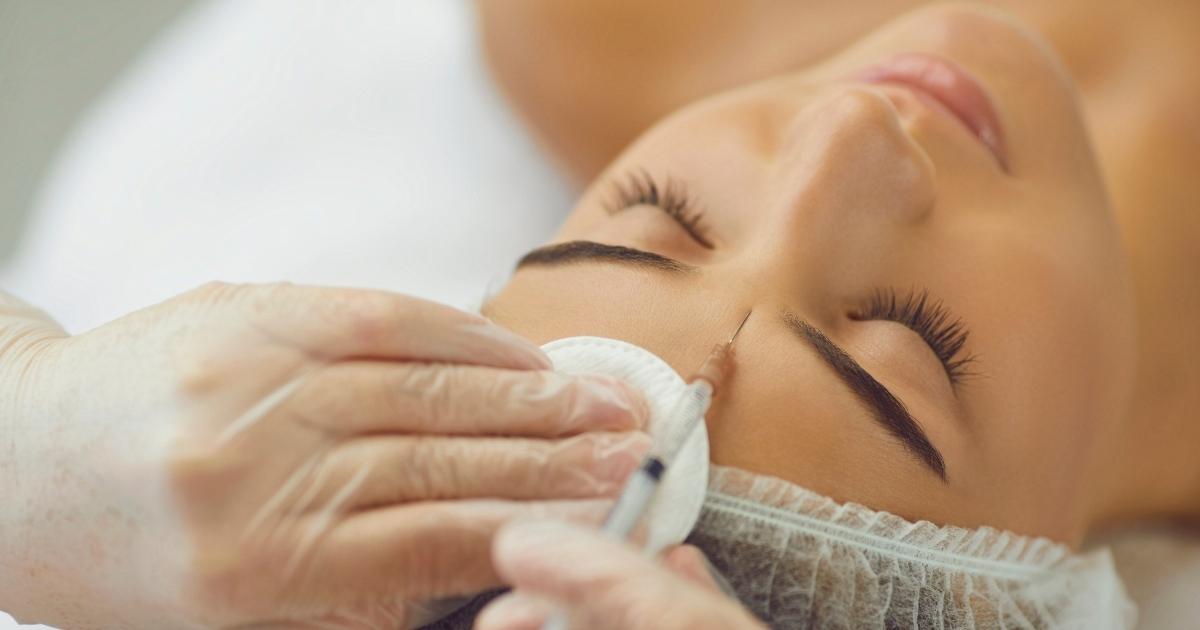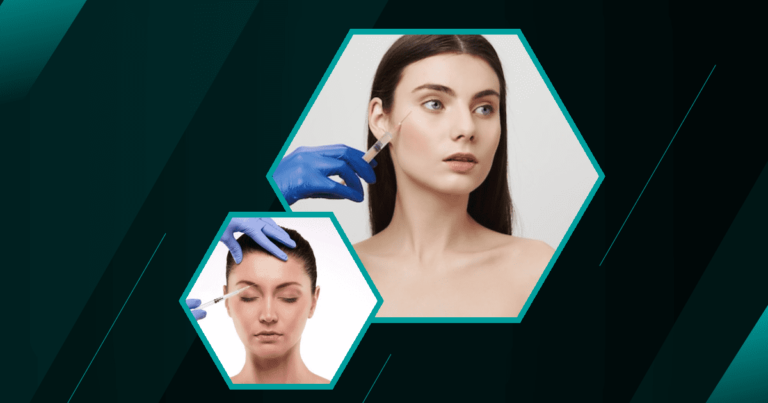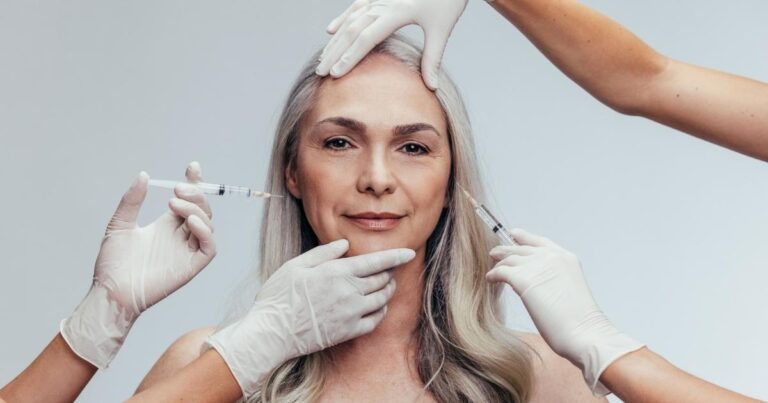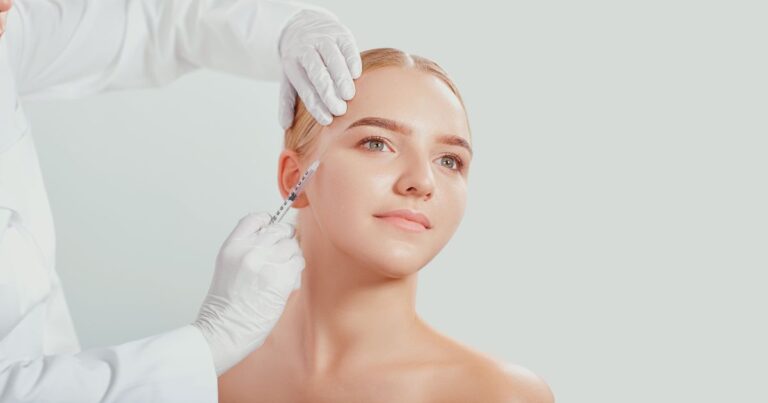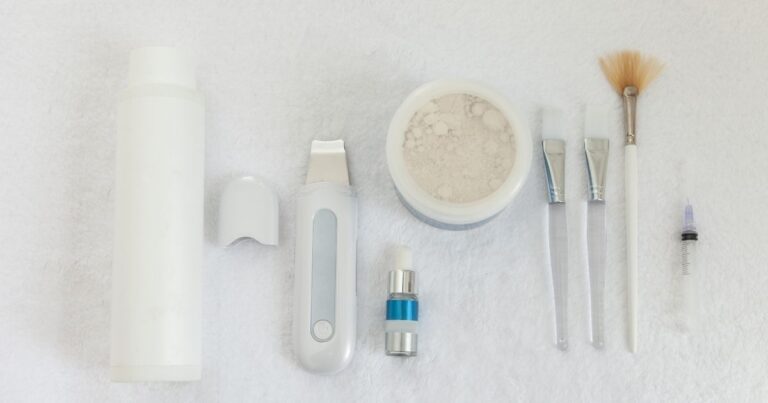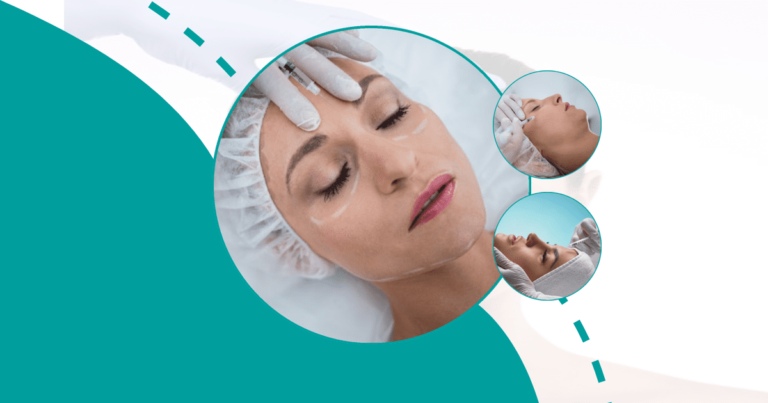In the quest for youthful skin, Botox has become a popular option. However, what is the long-term use of Botox like? This article explores the research findings and key facts about this treatment.
What are the significant findings of long-term research studies on the use of Botox?
Research into the long-term use of Botox has been comprehensive, revealing various findings. In addition to potential side effects, these studies examine its long-term impacts on health.
- Most studies have found that Botox continues to be effective over long-term use for its approved uses, including cosmetic applications, migraine treatment, and specific muscle and nerve disorders.
- Several studies indicate that the production of antibodies can neutralise the effects of Botox, which might develop resistance to it over time.
- Bruising and swelling at the injection site are usually temporary and mild side effects of Botox, which has a well-established safety record in the long term.
- There is minimal evidence to suggest any significant systemic effects or long-term health risks associated with the approved uses of Botox. However, more research is needed to understand the long-term use implications fully.
How does long-term Botox use affect the body, according to scientific research?
The effects of Botox on the body after prolonged use are highly individual, manifesting themselves in different ways and places for different people.
- When used long-term, Botox can maintain a wrinkle-free appearance and minimise facial expressions.
- In some cases, individuals may resist Botox with prolonged use. A reduction in Botox’s effectiveness usually occurs when antibodies against Botox start producing in the body.
- There is minimal evidence to suggest any significant systemic effects or long-term health risks associated with Botox use, mainly when administered in the small, localised doses typically used for its approved indications.
- While generally mild and temporary, side effects can include swelling, bruising, or discomfort at the injection site. More severe side effects are rare but can include difficulty swallowing, speaking, or breathing, mainly when Botox is used in larger doses, such as for treating certain neurological conditions.
- Several studies suggest long-term Botox use has mental health implications, especially regarding self-esteem and body image.
How does the long-term use of Botox affect the skin’s health, as per available studies?
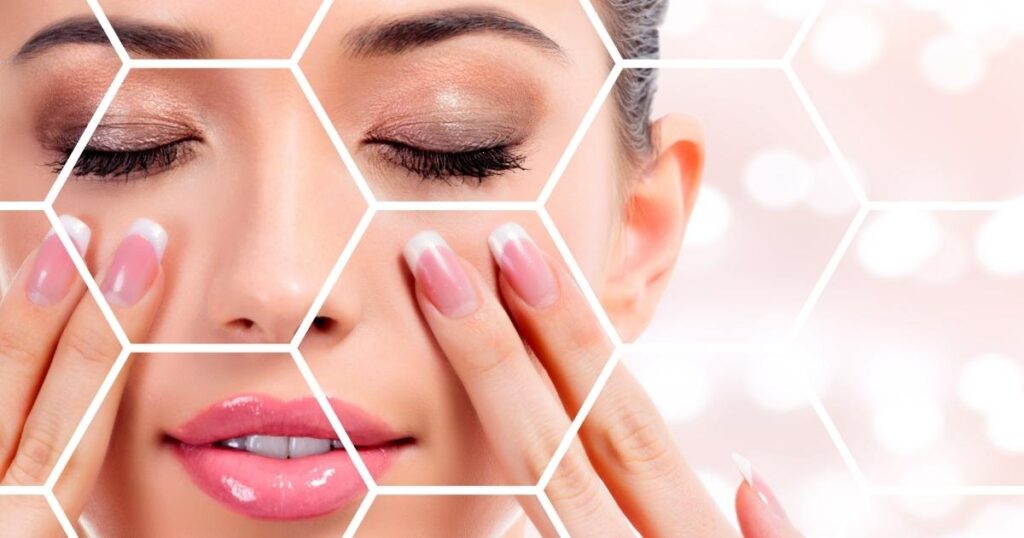
Studies have delved into the impacts of Botox on skin health when used over a long period. Findings indicate several positive and negative effects, including:
- Improvement in Skin Elasticity: Several studies suggest long-term Botox use can increase skin flexibility and elasticity, contributing to a youthful appearance. Botox seems to achieve this by temporarily paralysing the muscles, allowing the skin to recover from the repetitive contractions that can lead to wrinkles.
- Reduction in Wrinkles: The use of Botox on a regular and long-term basis can cause wrinkle visibility to be reduced, even at rest. This is mainly due to Botox’s ability to inhibit muscle contractions, a primary cause of wrinkle formation.
- Potential for Skin Atrophy: An alternative school of thought believes long-term Botox use could result in skin atrophy, which is thin and weak skin. However, this theory requires more rigorous scientific validation.
- Changes to Skin Texture: Some studies suggest that prolonged use of Botox might alter skin texture. This could be due to changes in the underlying musculature affecting the skin’s surface.
Does research reveal any severe side effects of long-term Botox use?

Despite Botox’s popularity, there are a few drawbacks to think about:
Book A Consultation With Dr Tarek Bayazid
Top-rated Plastic Surgeon For Botox in Dubai
Installment Plan Available
- Resistance to Botox: It has been found that individuals who use Botox regularly may develop resistance to the injection. This is believed to occur as the body develops antibodies against the toxin, rendering the treatments less effective.
- Muscle Weakness: Prolonged use of Botox can lead to muscle weakness, mainly if used in the same areas repeatedly. The effects may wear off if use is discontinued, but the duration can vary.
- Toxin Effects Spread: Botulinum toxins can occasionally spread to areas away from the injection site, resulting in botulism symptoms. This could include muscle weakness, vision problems, and difficulties with speech or breathing.
- Psychological Dependency: There are concerns about a potential psychological dependency developing in long-term Botox users, as some individuals may become overly reliant on the treatments for their self-esteem and body image.
- Adverse Reactions: An injection site may become swollen, and rashes or allergic reactions can occur. While not explicitly tied to long-term use, these potential reactions could be more likely to occur with repeated exposure.
Has research established any implications of Botox use on mental health over time?
However, specific research indicates that Botox should not be used for long-term mental health complications.
- Boosted self-esteem: According to research, long-term Botox treatment may improve mood and self-esteem because of perceived physical improvement.
- Anxiety and Depression: Using Botox long-term can, however, increase levels of anxiety and depression, possibly owing to the desire to maintain aesthetic standards.
- Body Dysmorphic Disorders: There is some concern that repeated cosmetic procedures such as Botox could contribute to Body Dysmorphic Disorder. In this mental health condition, a person obsesses over perceived flaws in their appearance.
- Emotional Blunting: An area of ongoing research is investigating the “facial feedback hypothesis,” the idea that facial expressions influence emotional experiences. Some studies suggest Botox, by inhibiting certain expressions, may affect users’ emotional processing.
Research on Botox’s effectiveness after long-term use: what do the results show?
Research into the long-term use of Botox shows varied results in terms of effectiveness:
- Diminishing Returns: Some studies suggest that the effects of Botox may become less pronounced with regular, long-term use due to the development of neutralising antibodies.
- Increased Effectiveness: Contrary to the above, other research indicates that prolonged Botox use could lead to longer-lasting effects due to atrophy (shrinkage) of the treated muscles.
- Maintenance Required: Most agree that Botox doesn’t offer a permanent solution, and regular maintenance treatments are necessary to sustain the desired effects.
- Safety and Efficacy: Overall, research backs up the safety and efficiency of Botox when appropriately administered, but it also points out that several variables, such as dosage, injection technique, and unique patient features, might affect its performance.
- Treatment Adaptation: With regular use, practitioners may need to adjust treatment strategies, such as dose or injection sites, to maintain Botox’s effectiveness.
What research exists on immune responses to Botox with prolonged use?
There have been scientific studies on the immune system’s impact on prolonged Botox treatment. The focus of these studies has been to understand:
- Potential for Antibody Formation: Some users may develop neutralising antibodies that could decrease the effectiveness of Botox.
- Influence on Immune System: There’s ongoing research on whether Botox affects the overall functioning of the immune system.
- Allergic Reactions: Rare instances of allergic reactions have been recorded and are under study.
- Inflammation and Swelling: An investigation is being conducted regarding Botox’s long-term effects on inflammation.
Are there any studies on the potential for developing resistance to Botox after long-term use?
The possibility of developing resistance or tolerance to Botox over time is a subject of scientific inquiry. Key areas of focus include:
- Formation of Antibodies: The body may produce antibodies against the Botox toxin, reducing its efficacy.
- Frequency and Dose: Studies are exploring how the frequency and dosage of Botox injections influence resistance.
- Patient-Specific Factors: Research is looking into individual differences in developing resistance.
- Alternative Treatments: The development of resistance has prompted research into alternative neurotoxin treatments.
How does the research characterise the longevity and durability of Botox results over time?
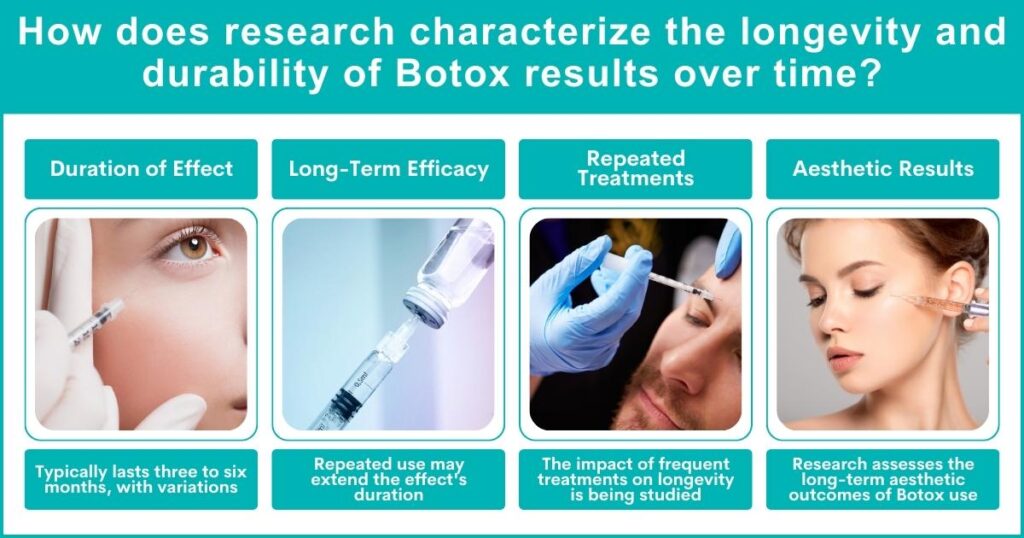
The sustainability and long-term effects of Botox are crucial topics of research. Main points of interest include:
- Duration of Effect: Research generally finds that Botox effects, with variations, last three to six months.
- Long-Term Efficacy: Some studies suggest repeated use extends the duration of the effect.
- Repeated Treatments: The influence of frequent treatments on the longevity of Botox’s effects is under scrutiny.
- Aesthetic Results: Studies are assessing the long-term aesthetic results of Botox use.
Based on research, what are the critical considerations for individuals contemplating long-term use of Botox?
Research has identified several critical factors individuals should consider when contemplating long-term Botox use. These factors include:
- Potential for Side Effects: Although generally safe, Botox does carry potential side effects that users should be aware of.
- Risk of Resistance: The possibility of developing resistance to Botox is a significant concern.
- Longevity of Results: The longevity and sustainability of results vary among individuals.
- Cost Implications: Long-term use can entail substantial financial commitments.
- Professional Consultation: It’s recommended to consult with a skilled professional before deciding on long-term Botox use.
The long-term use of Botox has potential benefits and risks. The research findings give us insights, but everyone must decide based on their unique situation. Always consult with a healthcare professional before choosing long-term Botox use.
Dr. Tarek Aesthetics is here to assist you if you need more information tailored to your needs regarding long-term Botox use.
Make your dreams a reality despite uncertainty. Begin your skincare journey with an informed decision. Book a consultation with our expert team at Dr Tarek Bayazid today. You can rely on us to provide insight and direction at every stage. Read this article to find out about the price of Botox in Dubai
